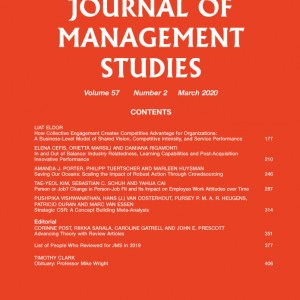
Bogaert, S., Boone, C. and \van Witteloostuijn\, A. (2012). Social Value Orientation and Climate Strength as Moderators of the Impact of Work Group Cooperative Climate on Affective Commitment Journal of Management Studies, 49(5):918--944.
-
Affiliated author
-
Publication year2012
-
JournalJournal of Management Studies
We investigate the moderating role of an individual's social value orientation (which refers to self- versus other-regarding preferences) and of climate strength (which refers to the extent of agreement among group members on group norms and values) on the relationship between work group cooperative climate and affective commitment among professional employees. We develop two plausible but opposite hypotheses on the moderation effect of social value orientation, one based on the behavioural assimilation assumption and the other on goal transformation theory. We argue that the work group's climate strength is an important contingency factor that affects which of both contradictory predictions holds. In a sample of 209 academic employees of a Belgian university, we find support for our arguments. Specifically, a cooperative climate enhances the affective commitment of employees with a prosocial value orientation (as predicted by the behavioural assimilation argument) but only when there is strong consensus among group members about the group's climate (high climate strength). Conversely, for those whose social value orientation is towards the self rather than others, a cooperative climate enhances affective commitment (consistent with goal transformation theory), especially when the climate is not agreed upon (low climate strength). These findings underscore recent claims that the predictive power of different theories in organizational behaviour depends on an individual's motives and values. We discuss the implications of our findings for the management of work groups consisting of employees with different social value orientations.